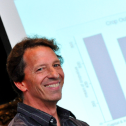Helping Rural Farmers Avoid Financial ’Shocks,’ Build Profits
Editor’s Note: The following post was originally published by The Consortium on Financial Systems and Poverty (CFSP) is a private research organization comprised of leading and emerging economists.
In many developing countries, the everyday well-being of the poor is profoundly tied to farming. In rural Ghana, where economist Chris Udry runs his CFSP research project, this is especially true.
Ghanaian farmers depend on their ability to harvest food to feed themselves and their families. When they have a surplus, they can also feed their communities and make a better living. But when the harvest is disappointing, as it often can be due to problems like drought or lack of fertilizer, the farmers suffer disruptive financial problems. Once again, life becomes challenging.
How do farmers negotiate these financial disruptions – called “shocks” by economists – and what technological or financial service advances might help them manage these shocks even better?
These questions are at the heart of Udry’s research project,“Examining Underinvestment in Agriculture.” Udry, who is one of the foremost American economists specializing in African development and a professor of economics at Yale University, talks below about how he thinks his research might help rural farmers in developing countries manage the everyday risks they face.
CFSP: How do you describe your research project and the questions you’re seeking to answer to non-economists?

Udry: What we’re trying to understand are the fundamental features of the economic environment that farmers in Ghana are faced with. We are concerned with poor farmers in poor areas with very poor capital markets. It’s difficult for them to save; it’s difficult for them to borrow. We know there are investments that could be profitable for the farmers, but they can’t achieve them without liquid assets, which few of them have, so they can’t invest. Parallel to that, farmers face an enormous amount of risk. Very small, regular shocks could have disastrous consequences for them, and they, overall, are risk averse. Also, without access to insurance, they cannot take on investments that, on average, we know to be profitable but risky.
We are trying to understand these dimensions of the environment that farmers face by investigating whether there is a change in behavior if we provide grants of money and/or insurance against the risks they face. This is fundamentally a science project not a policy project. We are trying to investigate the nature of the environment rather than directly testing a specific set of policy interventions that can be rapidly scaled up.
If we see changes in farming behavior, in response to the money we provide, or in response to the insurance that the farmers receive that will tell us there are problems in the financial environment. If farmers who receive a capital grant invest more in their farms, that is direct evidence of credit constraints and/or barriers to saving. Similarly, if farmers who receive insurance from us increase their investment on their farms, that is a direct evidence of incomplete insurance arrangements.
CFSP: What do you hope to contribute to the understanding of financial systems and poverty with your project?
Udry: For someone interested in microfinance and micro-investments, it’s an interesting project because no one’s going to give farmers money for a project that’s not related to policy. But, the farmers’ response tells us that they are facing really bad loan market situations. They can’t borrow. It also tells us how hard it is for them to save from one year to the next. When we are seeing farmers getting our cash grants, they are hiring a lot more labor. That’s telling us there are problems in the capital markets. It tells us there is a demand for microfinance interventions. But, this program does not say what kind of microfinance can help. This program tells us these groups have a demand for saving and borrowing.
On the insurance side, our work can be more directly tied to policy. Crop insurance has failed universally, but we offer rainfall index insurance.The reason this can work is because pricing is based on an important source of risk to the farmer. Rainfall is very variable. There’s no irrigation. If it rains too much or too little, profits will go down. We offer insurance tied to a nearby weather station. Our insurance won’t track profit variations perfectly (the difference between profits and what we give them is called basis risk), but we work hard to minimize the basis risk.
The benefits are that there is no moral hazard, no adverse selection, it depends on what is publicly observable (so farmers cannot influence it), and it’s cheap to do. We offer them a certificate that says if it rains so much, you’ll be paid so much. It’s easy to imagine how to commercially expand this. We find really high demand for rainfall insurance in our area.
CFSP: What interested you in this line of research?
Udry: I’ve been working on risk and poor farmers since my dissertation in the late 1980s. I’m interested in how people deal with risk and how it shapes their lives. I’ve lived in this area in northern Ghana, and I know how important farming is in these communities. Rainfall insurance isn’t new, but with the boom of microfinance, there is increased interest. There’s a lot of buzz around it, and it seemed like a feasible research objective to reach now.
Really, risk and imperfect financial markets have been at the core of my understanding of poor people and rural poverty. CFSP has given me the opportunity to go in and examine it in a much more serious way. In some respects, CFSP is now an insurance company. The challenge down the road is going to be to identify a larger, commercial insurance partner to help bring what we’re discovering to a wider part of the population.
Please like NextBillion on Facebook and follow us on Twitter.
- Categories
- Agriculture